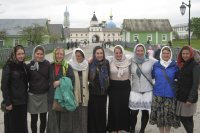
Bates commencement slated for May 29; Tutu to speak
Desmond Tutu, archbishop emeritus of the Diocese of Cape Town and winner of the Nobel Peace Prize for his advocacy of racial justice in South Africa, will receive an honorary doctor of humane letters degree and speak at the 134th commencement at Bates College. Donald W. Harward, president of Bates College, will confer bachelor’s degrees on approximately 475 seniors at 10 a.m. Monday, May 29, in an outdoor ceremony in front of Coram Library. In case of rain, the graduation exercises will be held in the nearby Margaret Hopkins Merrill Gymnasium.
Joining Tutu as honorary-degree recipients will be human rights activist and publisher Robert L. Bernstein, award-winning modern dance choreographer Trisha Brown, scientist and educator Shirley Mahaley Malcom and scholar and psychologist Beverly Daniel Tatum.
After becoming ordained in Johannesburg, South Africa, in 1961 and earning bachelor of divinity honors and master of theology degrees in London, Tutu joined the staff of the Federal Theological Seminary in Alice and became chaplain at the University of Fort Hare. Tutu became dean of St. Mary’s Cathedral, Johannesburg, in 1975, and was shortly thereafter elected Bishop of Lesotho. By this time South Africa was in turmoil after the Soweto uprising, and Tutu was persuaded to leave the Diocese of Lesotho to take up the post of General Secretary of the South African Council of Churches (SACC). It was in this position, which he held from 1978 to 1985, that Tutu became an international figure in the struggle to end apartheid.
Tutu, heavily embroiled in controversy as he spoke out against the injustice of apartheid, was denied a passport to travel abroad until 1982, when the South African government relented in the face of national and international pressure. Tutu’s name became synonymous with the SACC, as he became the leader of the crusade for justice and racial conciliation in South Africa.
In 1995, President Nelson Mandela appointed Tutu to chair South Africa’s Truth and Reconciliation Commission, established to probe gross human rights violations of apartheid and allow victims and perpetrators to move forward with their lives after a cathartic forum of admissions of guilt, castigation and, ultimately, forgiveness. Tutu is the author of six collections of sermons and writings, including “Crying in the Wilderness,” “The Rainbow People of God” and “No Future Without Forgiveness.” His contribution to the cause of racial justice in South Africa has been recognized with the Nobel Peace Prize, the Archbishop of Canterbury’s Award for Outstanding Service to the Anglican Communion, the Family of Man Gold Medal Award and the Martin Luther King Jr. Nonviolent Peace Prize.
Bernstein has devoted his life to the active defense of freedom of expression and to the protection of victims of injustice and abuse throughout the world. In his many years as chairman, president and chief executive officer of Random House, one of the major publishing houses in the United States, Bernstein seized every opportunity to give a voice to persecuted minorities and to defend authors from attempts to silence them or restrict their freedom of expression. Under his leadership, Random House published authors banned in the former Soviet Union and elsewhere, including Andrei Sakharov, Elena Bonner, Vaclav Havel, Jacobo Timerman, Lev Kopelev and Vasily Aksyonov. Bernstein also founded the Fund for Free Expression (FFE), an independent human rights group that included many well-known U.S. writers, including E.L. Doctorow, Anthony Lewis and Toni Morrison, concerned with freedom of expression. The FFE also functioned as the U.S. board for the British magazine Index on Censorship, which publishes the works of silenced writers throughout the world.
Bernstein has founded, led and inspired an array of human rights organizations in the United States, including Human Rights Watch, of which he is the founding chair.
Human Rights Watch, widely known for its painstaking documentation of abuses and effective advocacy in the press and with governments, has pushed the boundaries of its mandate to include violations of the Geneva conventions by governments and guerrilla groups, and to safeguard the rights of women, children, lesbians and gays. Abroad, Human Rights Watch successfully blocked the selection of Beijing to host the 2000 Olympics and was the first organization to call for an international war crimes tribunal to prosecute crimes in the former Yugoslavia. At home, Human Rights Watch has investigated rape and abhorrent conditions in “super maximum” prisons. Bernstein, who received his bachelor’s degree from Harvard University, is the recipient of the Eleanor Roosevelt Human Rights Award, the Spirit of Liberty Award and the Lotus Club Medal of Merit.
Since becoming one of the leaders of New York’s Judson Dance Theater in 1960, Brown has had a continuous influence on contemporary choreography. Hailed as a creator of post-modern dance, Brown’s early choreography used New York City’s architecture; performances were held on roof tops, rafts, interior walls and the sides of buildings. After founding the Trisha Brown Company in 1970, she began a series of large-scale theatrical productions that transformed traditional stage space, collaborating with such artists as Robert Rauschenberg, Donald Judd, Laurie Anderson, Nancy Graves, Fujiko Nakaya and John Cage. Her work “Twelve Ton Rose,” with music from Anton Webern’s Opus Nos. 5 and 28, was hailed by The New York Times as a “dance so filled with mystery and beauty that it promises to be a signature work for the choreographer.” Her highly acclaimed production of Monteverdi’s opera “L’Orfeo” had its world premiere at the Théâtre Royal de la Monnaie in Brussels in May 1998, then traveled to the Barbican Centre in London, the Festival International d’Art Lyrique et de Musique in Aix-en-Provence and the Theatre des Champs Elysees in Paris.
The first woman to receive the coveted MacArthur Foundation Fellowship in choreography, Brown has received several fellowships from the National Endowment for the Arts. In 1987, she received a Dance Magazine award for “25 years of sustained innovation,” and the Laurence Olivier Award for “most outstanding achievement in dance.” She has been awarded the Prix de la Danse de la Societe des Auteurs et Compositeurs Dramatiques and has been named Officier dans l’Ordre des Arts et des Lettres in France, where she has been dubbed the “high priestess of modern dance.”
Malcom is head of the Directorate for Education and Human Resources programs of the American Association for the Advancement of Science (AAAS), overseeing programs in education, activities for underrepresented groups and public understanding of science and technology. Malcom was head of the AAAS Office of Opportunities in Science from 1979 to 1989. Between 1977 and 1979, she served as program officer in the Science Education Directorate of the National Science Foundation (NSF). An accomplished scientist and ecologist, she held professorial positions in biology at the University of North Carolina at Wilmington and has served as a secondary teacher of science. She was a member of the National Science Board, the policymaking body of the NSF, from 1994 to 1998 and currently serves on the President’s Committee of Advisors on Science and Technology.
Malcom is a member of the Board of Directors for the American Museum of Natural History, the Howard Heinz Endowment and the National Center on Education and the Economy. She serves as a trustee of Adelphi University and California Institute of Technology and as a regent of Morgan State University. A former trustee of the Carnegie Corporation of New York, she was elected a fellow of the American Academy of Arts and Sciences in 1995. Malcom received her bachelor’s degree with distinction in zoology from the University of Washington; her master’s degree in zoology from the University of California, Los Angeles; and her doctorate in ecology from The Pennsylvania State University.
Tatum focuses her work on race relations in America, particularly black families in white America, racial identity in teens and race in the classroom. A clinical psychologist and a professor of psychology and education who maintains a consulting practice, Tatum is dean of the college at Mount Holyoke College. In her book “Why Are All the Black Kids Sitting Together in the Cafeteria? And Other Conversations About Race,” Tatum applies her expertise on race to argue that straight talk about racial identity is essential to the nation. Transcending the usual black-white paradigm, the book, which uses real-life examples and the most contemporary research, not only dispels race as taboo, but also gives readers a new lens through which race as a developmental factor can be experienced and understood by everyone.
“Why Are All the Black Kids Sitting Together in the Cafeteria?” exploded onto the national scene as President Clinton’s “Initiative on Race” was developing, and, in December 1997, she was one of three authors to appear with Clinton at the Akron national town meeting on race. Prior work by Tatum includes “Assimilation Blues: Black Families in a White Community” (1987) and a 1992 Harvard Educational Review article “Talking About Race, Learning About Racism: An Application of Racial Identity Development Theory in the Classroom.” Prior to joining the Mount Holyoke faculty in 1989, Tatum was an associate professor and assistant professor of psychology at Westfield State College and a lecturer at the University of California, Santa Barbara’s Department of Black Studies. She received her bachelor’s degree in psychology from Wesleyan University and master’s degree and doctoral degree in clinical psychology from the University of Michigan, Ann Arbor.




